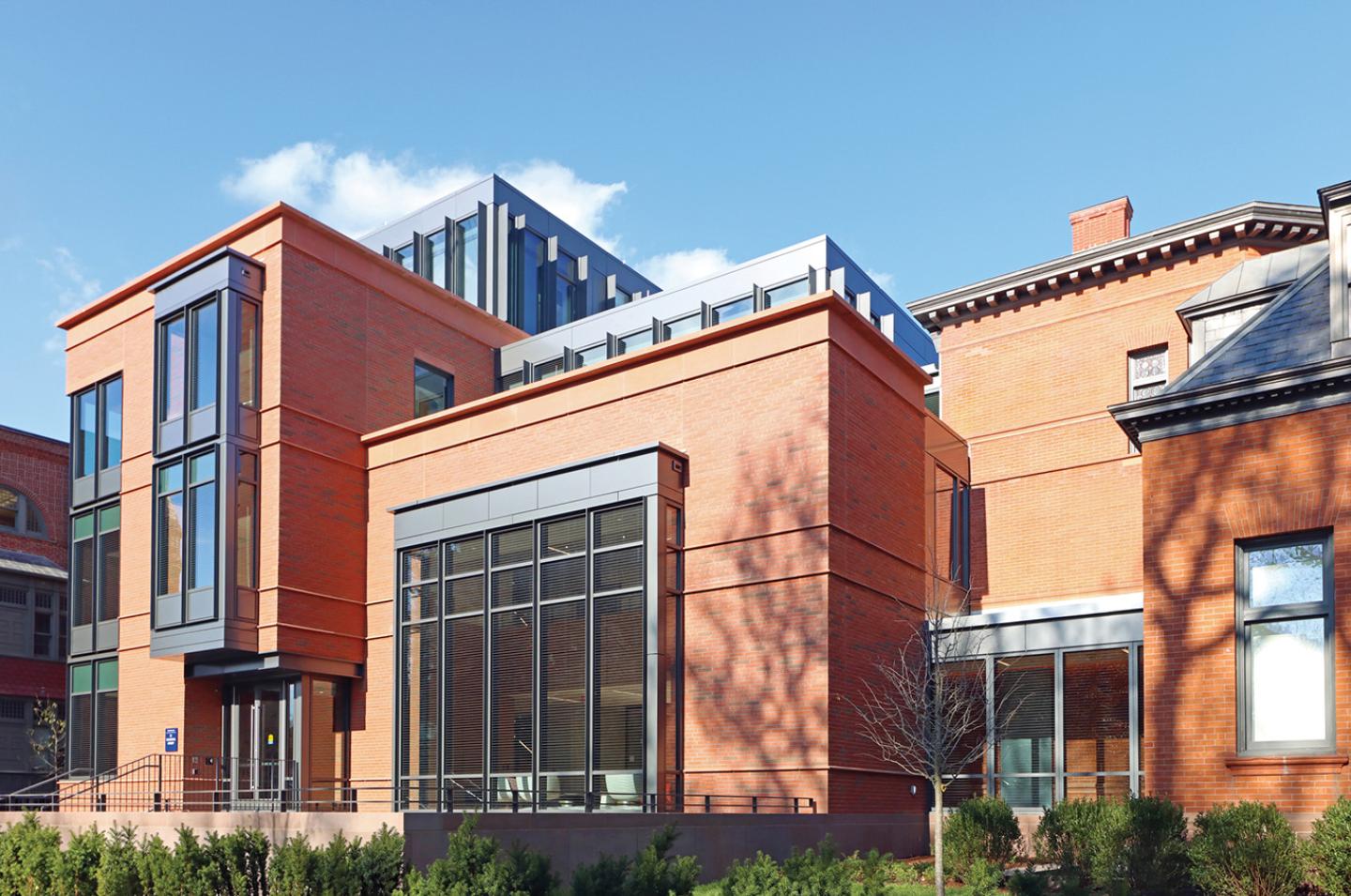
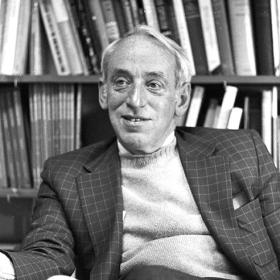


Members of the Yale community gathered in April to dedicate the Tobin Center for Economic Policy.
The center is named for the late James Tobin, iconic Yale faculty member and winner of the 1981 Nobel Prize in economics. Over his more-than-fifty-year career, Tobin established himself as a leading economic theorist as well as a beloved mentor to generations of students.
The Tobin Center and its new home at 87 Trumbull Street came to be thanks to generous gifts from Anita and Josh Bekenstein ’80, Amandine and Stephen Freidheim ’86, and an anonymous lead donor, along with more than fifty other alumni, parents, and friends.
“As Yale’s newest research enterprise, the Tobin Center advances our most enduring ideal, one dating back to our founding documents: to improve the world for this and future generations,” said Yale President Peter Salovey ’86 PhD at the dedication ceremony. “Our tradition of civic leadership is epitomized by this center, where evidence-based, cross-disciplinary social science research already defines and informs public policy. My heartfelt appreciation goes out to all of you who have supported this project. You are now part of Yale’s legacy, and part of our commitment to making a difference.”
Research for Impact
At the dedication, Tobin Center Executive Director David Wilkinson ’06 JD highlighted the mission of the center as one of impact, building on the long legacy of the Department of Economics with research focusing on domestic policy issues.
“At the Tobin Center, we answer policy questions that previously could not have been answered, bringing to the policy arena new innovations in data-intensive economics research,” Wilkinson said. “We are creating at Yale a new model for how higher education can bring value to society—finding new ways for world-class faculty to put forward policy insights. We are enabling students and junior scholars to roll up their sleeves and take on challenges that face policymakers and communities today. And we’ve seen real-world results: new ideas in the public debate and media, but also in legislation and executive actions that are making lives better.”
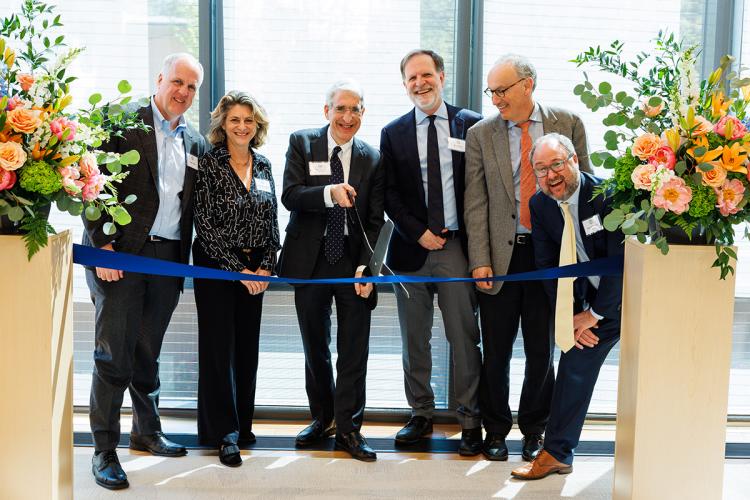
In the more than three years since the Tobin Center was founded, its research has propelled the passage of landmark legislation to prohibit the practice of surprise billing, been cited in federal regulation upheld by the Supreme Court, and informed the testimony of cabinet secretaries. It has also directly informed government action on issues ranging from climate change and student loan forgiveness to consumer protection and supply chains.
“The Tobin Center will use the best models and the best data to shed light on the greatest issues of our time, maintaining Yale as a touchstone of truth in our divided world,” said Ben Polak, William C. Brainard Professor of Economics. “These current-day efforts are rooted in the foundation built by Department of Economics visionaries Richard Levin, William Brainard, and James Tobin.”

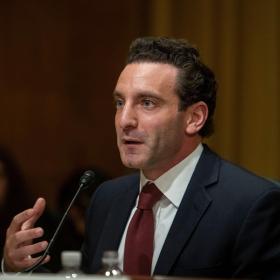


An End to “Surprise Billing”
Work from the Tobin Center has spurred legislative action. Research from Zack Cooper, associate professor of public health and economics, and Fiona Scott Morton, the Theodore Nierenberg Professor of Economics, found that one in five patients who went to hospitals within their health insurance networks were treated by out-of-network doctors, resulting in “surprise bills” that cost an average of $622.55.
The study made headlines nationwide, and lawmakers began to investigate, bringing Cooper to Washington to meet with congressional leaders and present his work at the White House. Congress ultimately passed a bill prohibiting hospitals from charging for emergency care performed by out-of-network physicians.
“The goal for my work is to produce scholarship that is both academically rigorous and makes the lives of those outside the academy better,” Cooper says. “In many cases, that means more than just producing academic articles. It means taking our peer reviewed work and injecting it into the public square. This means speaking to journalists and using the work to inform the public and inform policymakers about what the evidence we’ve discovered suggests and how it can be used for the betterment of society.”
The Tobin Center funded Cooper and Scott Morton’s work, which exemplifies its mission of conducting academic research to affect policy for the common good.
“Yale provides us with immense opportunities, and with those opportunities comes an obligation to try and help solve some of the major issues we’re facing in the domestic policy arena,” Cooper says. “Tobin helps us do research on the core issues of the day and then meet our obligations to the wider public to do good with the work.”

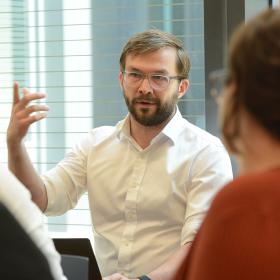


Universal Pre-K: Costs & Benefits
Proponents of public early childhood education programs argue that it will improve educational outcomes long term and address inequality by lightening the burden that childcare places on working parents.
However, as more and more states consider universal pre-K, lawmakers have little data to use to assess whether the long-term benefits of these programs come to fruition.
The Tobin Center, in partnership with the State of Connecticut and New Haven Public Schools, is producing a first-of-its-kind longitudinal study aiming to fill this knowledge gap.
“This project aims to understand how free public pre-K programs affect families and society,” says John Eric Humphries, assistant professor of economics. “Our current study focuses on the long-term effects of these programs on parental labor supply and children’s outcomes. The partnership with the state greatly enriches this research, helping us estimate the benefits to families and the costs to the government. Despite its challenges, I believe this type of long-term research is crucial for understanding the impacts of pre-K programs and informing policy.”
Cementing a Legacy
The 87 Trumbull Street facility also brings together the Faculty of Arts and Sciences Department of Economics, which was previously housed in multiple, disconnected buildings on Hillhouse Avenue. With the new building in place, the entire department now operates in a single building complex, fulfilling a dream of its namesake.
“Tobin wanted to bring the entire department together rather than let it remain disjointed,” said Steven Berry, the David Swensen Professor of Economics and Faculty Director of the Tobin Center. “He championed a connection between two of the buildings, a feature that still exists in the basement of the renovated complex. Decades later, the new building finally brings the entire department together and serves as home to a center carrying on Tobin’s legacy. This building is alive with the connections that will sustain this department and institution.”
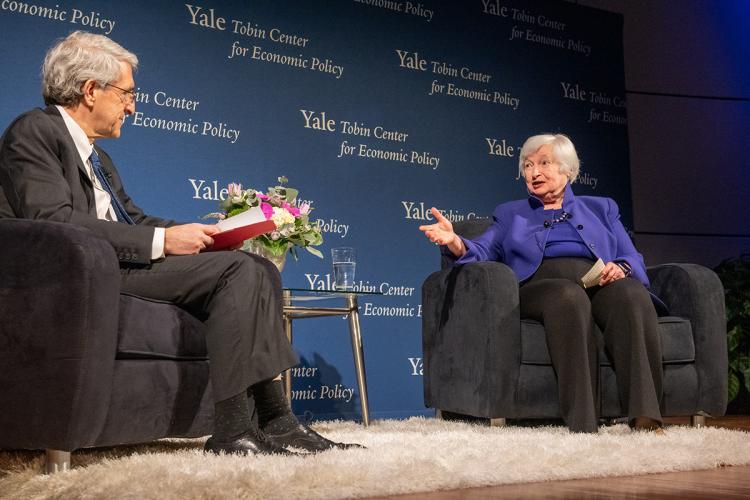
At a Tobin Center event in April, US Treasury Secretary Janet Yellen ’71 PhD discussed the value of the center’s research with Yale President Peter Salovey.
“I feel very strongly, as Tobin did, that economics should be about something, and that it should make a difference to the well-being of our nation and the world,” Yellen said. “These are really the values that the Tobin Center stands for. The center has been doing important research, and I think national policy will benefit from that kind of data-driven approach that is focused on real problems.”
Top image: Yale’s Tobin Center for Economic Policy; photo by Ronnie Rysz
